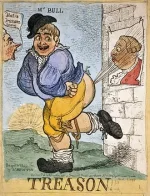- Joined
- Jun 18, 2018
- Messages
- 78,018
- Reaction score
- 81,965
- Gender
- Male
- Political Leaning
- Progressive
"With its new term starting this month, the Supreme Court will likely confront calls to upend constitutional law yet again. One very possible target is people’s everyday right to voice their political opinions, to speak up, even just to swear.
...a federal court of appeals decided a First Amendment challenge by JD Vance and others. ...the challenge was rejected. But five judges argued that the case might come out differently if only the Supreme Court would start treating First Amendment cases the way it has recently begun treating Second Amendment cases. Specifically, Judge John Bush said that judges should discern the original understanding of free speech in “linguistical meaning” and “evidence of how Americans ordered their lives” in the 1790s.
...Recently, Judge Kevin Newsom of the Court of Appeals for the 11th Circuit said it would be “terrific” if courts started asking “what ‘the freedom of speech’ meant to the founders.” In NetChoice LLC v. Paxton... the Court of Appeals for the Fifth Circuit even criticized the challengers of the law for relying on legal precedent rather than the “original public meaning” of the First Amendment.
...During the founding era, the right to free speech was understood much more narrowly than it is today. Something as simple as swearing or voicing unpopular political opinions might land you on the wrong side of the law. If rules from the 1790s were enforced today, citizens could be jailed for criticizing politicians, public figures could freely use defamation law to punish critics and schoolchildren would have few if any free speech rights.
...Historically, the wrong kind of speech could land you in jail. Laws criminalizing blasphemy, government criticism, tepid sexual content and other speech viewed to be bad or harmful were commonplace at the country’s founding. In the 1770s, the Continental Congress outlawed theater because it was viewed as too culturally English. In the 1790s, Congress, controlled by one party, passed a law making it easier to imprison political opponents. Later, Southern states outlawed abolitionist speech. And throughout our history, the government prosecuted undesirable political minorities. This is not a history we should wish to resurrect."
Link
We really shouldn't have to live as they did over 200 years ago.
...a federal court of appeals decided a First Amendment challenge by JD Vance and others. ...the challenge was rejected. But five judges argued that the case might come out differently if only the Supreme Court would start treating First Amendment cases the way it has recently begun treating Second Amendment cases. Specifically, Judge John Bush said that judges should discern the original understanding of free speech in “linguistical meaning” and “evidence of how Americans ordered their lives” in the 1790s.
...Recently, Judge Kevin Newsom of the Court of Appeals for the 11th Circuit said it would be “terrific” if courts started asking “what ‘the freedom of speech’ meant to the founders.” In NetChoice LLC v. Paxton... the Court of Appeals for the Fifth Circuit even criticized the challengers of the law for relying on legal precedent rather than the “original public meaning” of the First Amendment.
...During the founding era, the right to free speech was understood much more narrowly than it is today. Something as simple as swearing or voicing unpopular political opinions might land you on the wrong side of the law. If rules from the 1790s were enforced today, citizens could be jailed for criticizing politicians, public figures could freely use defamation law to punish critics and schoolchildren would have few if any free speech rights.
...Historically, the wrong kind of speech could land you in jail. Laws criminalizing blasphemy, government criticism, tepid sexual content and other speech viewed to be bad or harmful were commonplace at the country’s founding. In the 1770s, the Continental Congress outlawed theater because it was viewed as too culturally English. In the 1790s, Congress, controlled by one party, passed a law making it easier to imprison political opponents. Later, Southern states outlawed abolitionist speech. And throughout our history, the government prosecuted undesirable political minorities. This is not a history we should wish to resurrect."
Link
We really shouldn't have to live as they did over 200 years ago.

